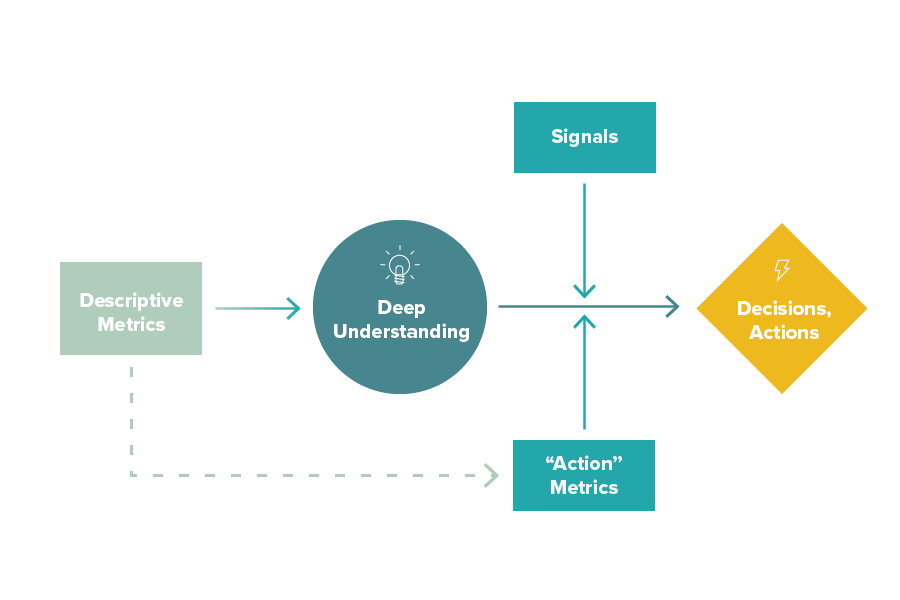Everyone loves a good metric. As product managers, we probably proudly proclaim that we are getting better at making decisions based on data rather than gut instinct. How everyone gathers, visualizes, and uses information — in product management and beyond — has certainly changed for the better over the years. In the past, we were overloaded with data and graphs to the point where we couldn’t see the forest through the trees anymore. But now, we have learned to become more selective. Now the few, hand-picked metrics we use should all be driving decisions and be highly actionable, right?
And of course, there’s anything wrong with that. However, I’ve seen this reliance on actionable metrics go too far.
When confronted with a metric, a person’s response might be, “Why do I need to know that? Why should I care? This is interesting, but I can’t make any decision based on this; it’s not actionable for me!”
I certainly don’t want to promote useless, superfluous, or even metrics, but I would like to make a case for the intelligent use of descriptive metrics.
So, what are those? Descriptive metrics are ones that describe key characteristics of an object or process.
Why Descriptive Metrics Matter
Why should you care about descriptive metrics? Let’s consider a few examples.
You — big surprise! — inherit a house from your grandmother. Wouldn’t you want to know where it is located, how big it is, how many stories it has, when it was built, and what the property taxes are? Absolutely! Are these “metrics” actionable? Not really. There’s nothing much you can do with knowing whether it has 1 or 3 stories or the year it was built.
But are these things helpful to know? For sure.
Now for a business-related example. You are hired to run a division of a large organization. I’m sure you would care to know, for example, the number of employees of this division, the org structure, revenue, product portfolio mix, P&L, etc. Again, these are not likely to spur any immediate actions, but you can’t effectively run this division unless you understand these key characteristics.
So what is the purpose of descriptive metrics? It’s to develop a deep understanding of whatever object or process they’re describing.
I can’t properly manage or operate anything unless I have a solid and thorough understanding of its composition and characteristics. Are these metrics immediately actionable in and of themselves? No, not right out of the gate.
From Descriptive Metrics to Actionable Insights
Once I am equipped with the in-depth knowledge of these metrics including their typical behaviors and trends, I will be able to properly process new information and incoming signals, and then make decisions. Those signals could be exceptions, new trends, or deviations from established patterns or benchmarks.
For example, if I know my seasonable sales volume in fall is usually down 10% compared to summer, I will recognize that a 20% drop is something that requires attention. If my employee engagement is suddenly up 30% compared to the last two years, it looks like I’m doing something right.
While a metric may initially be only descriptive, the combination of its current value with the deep understanding of typical behavior can actually turn it into an actionable one.

What does this mean for product managers? If you want to really be in charge of a product, you must deeply understand not only its functionality but all its characteristics, as well as how it’s being used and sold. In the case of a SaaS product, I recommend that you know things like:
- Monthly active users (MAU)
- Frequency of use/engagement/repeat visitation
- Average time on site/session duration
- Most used pages/features
- Monthly recurring revenue (MRR)
- Churn/retention rate
- Support volume
- NPS
- Feature cycle time
Are all of these metrics actionable? Not right away. Are they critical for understanding, operating, and growing a product, and providing value to your company? Yes!
Again, I’m not making the case for burying ourselves in a confusing array of data and metrics. But don’t be too quick to dismiss certain metrics as “not actionable” and not necessary. A deep understanding of your product is not optional and descriptive metrics are necessary for that. Before you know it, they may even turn out to be quite actionable.


